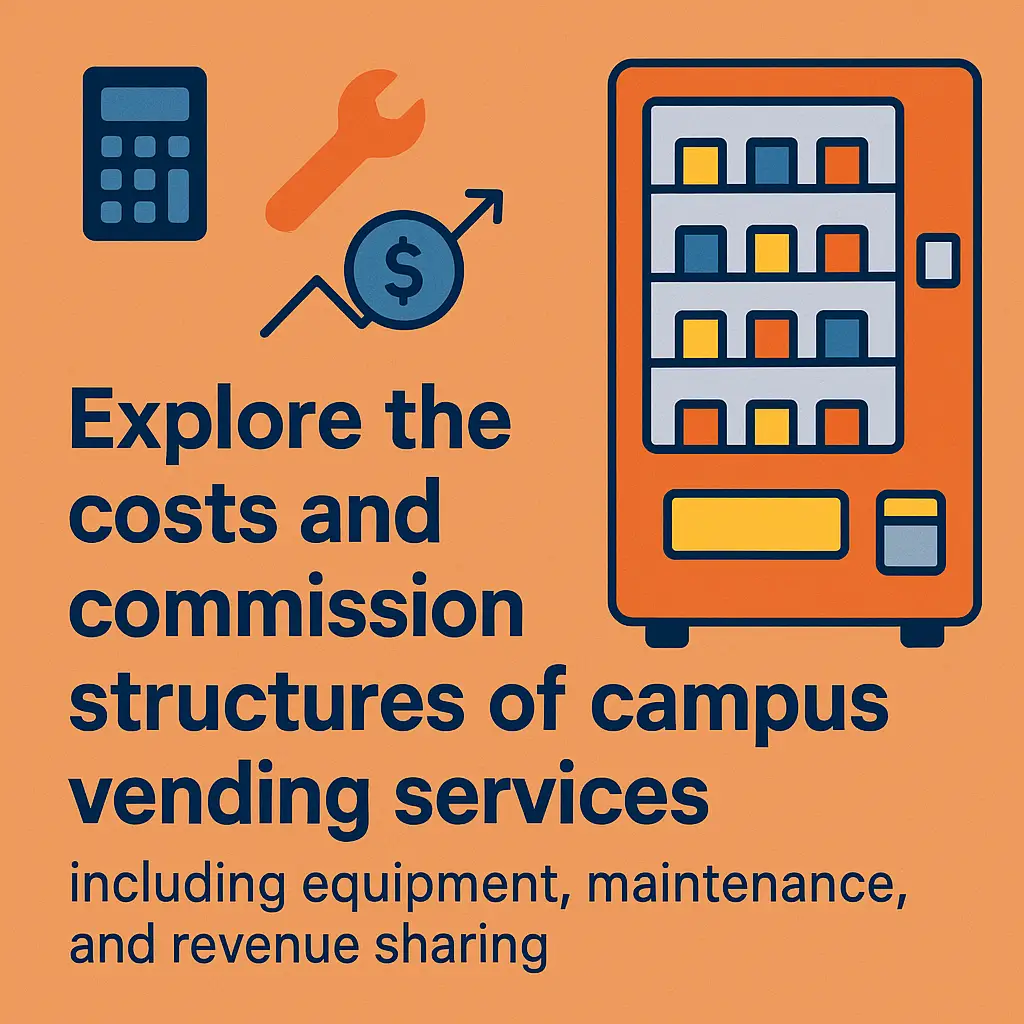Cost of Vending Services for Colleges and Universities
Explore the costs and commission structures of campus vending services—including equipment, maintenance, and revenue sharing.
Back to Vending for Colleges ResourcesExplore the costs and commission structures of campus vending services—including equipment, maintenance, and revenue sharing.
Back to Vending for Colleges ResourcesMost colleges pay little to no upfront costs for vending machines. Ongoing expenses are typically covered by revenue from product sales, with commissions shared between the school and operator.
![]() Commission rates vary by location and product sales volume
Commission rates vary by location and product sales volume
![]() Most colleges receive revenue sharing from vending machine sales
Most colleges receive revenue sharing from vending machine sales
![]() Maintenance and equipment costs are typically included in service
Maintenance and equipment costs are typically included in service

When colleges consider adding or upgrading vending machines, one of the first questions that arises is the overall cost. Understanding how expenses, commissions, and revenue sharing work can help administrators make informed decisions. Fortunately, many institutions discover that vending services require little to no upfront investment.
Most colleges do not pay for vending machine equipment or delivery. Machines are typically installed at no cost, and setup is often completed within a week. This makes vending an attractive option for campuses looking to expand food and beverage access without straining budgets. The primary financial consideration comes from how commissions are handled after sales begin.
Revenue sharing is a central element of campus vending. Colleges commonly receive a percentage of sales, with commission rates varying by product type and location. High-traffic areas such as student centers and libraries generally produce stronger returns. University vending contracts often outline specific percentages and conditions to ensure transparency between all parties involved.
Another major factor is service and maintenance. Regular stocking, cleaning, and repair work are usually covered as part of the agreement. Colleges avoid unexpected expenses since equipment upkeep is built into the service model. This ensures machines remain operational, reliable, and stocked with student favorites such as snacks, water, and energy drinks. For more context on service expectations, review this resource on campus vending setup.
In addition to offsetting costs, vending programs often generate funds for student groups or facilities budgets. By strategically placing machines in high-traffic spots, colleges can increase both accessibility and revenue. Choosing the right mix of products—including healthier options—can also support student wellness goals. To see an example of how vending improved outcomes, check out a case study on modern campus vending.
If you're exploring vending options for your business, Vending Exchange can help simplify the process. Delivery, Installation and Equipment is provided at no cost to you - vendors provide the machines, keep them stocked, and handle all servicing. Whether you need a provider or full-service management, just fill out the form on this page to get started.
No, installation and equipment are typically provided at no upfront cost to colleges.
Colleges usually receive a percentage of sales, with rates varying by location and product demand.
Maintenance is generally included in the service, ensuring colleges avoid unexpected repair costs.
Yes, most colleges receive revenue through commission structures outlined in their agreements.
High-traffic locations and popular product choices often drive higher sales and greater commissions.
Many colleges allocate a portion of vending revenue to student organizations or facility improvements.
Most installations are completed within a week once agreements and placements are finalized.
Repairs are part of the service contract, and response times are outlined in advance.
Yes, campuses can request machines stocked with water, low-sugar drinks, and nutritious snacks.
No, revenue is typically shared, with commissions returned to the college and the remainder reinvested into operations.